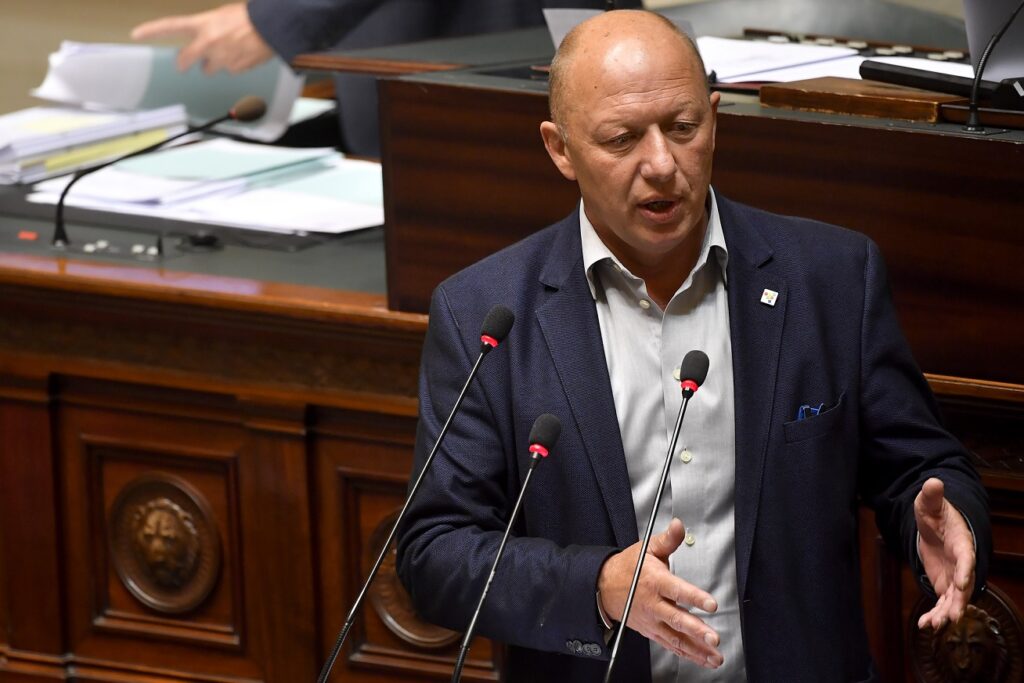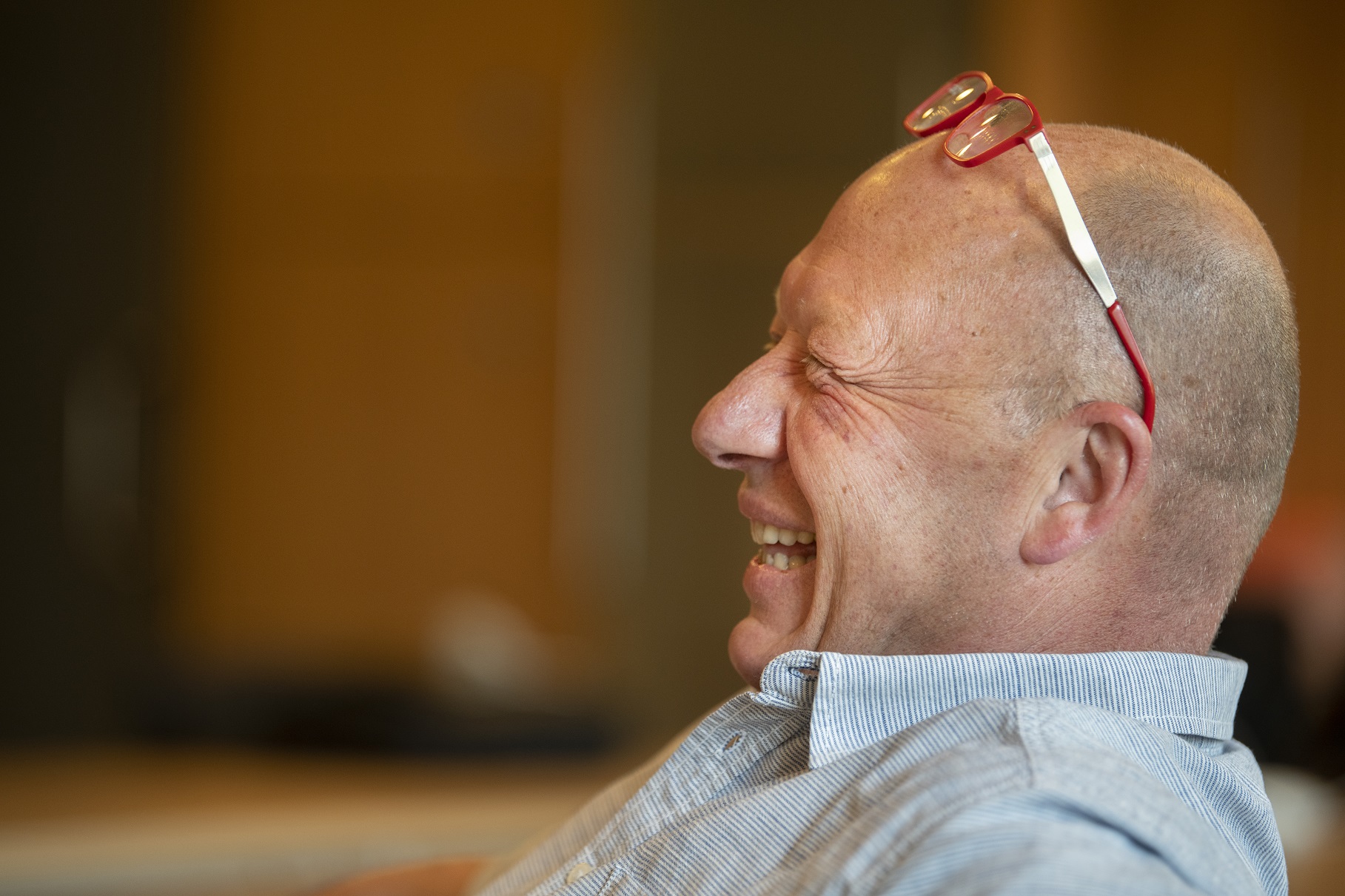Parked in front of Vilvoorde’s stately but unremarkable city hall is a solitary e-bike. It belongs to Hans Bonte, the city’s unshowy but certainly not unremarkable mayor. Indeed, not every mayor gets invited to speak at an anti-terrorism conference at the White House. And while the bike appears a dullish grey colour, its owner’s time in office, now approaching a decade, has been anything but colourless.
Back at the start of his tenure, Vilvoorde was confronted with rising Islamic radicalisation. His attempt to engage with the city’s Muslim community to combat this threat attracted the attention of Washington and the call to speak at an event on radicalism with then-US President Barack Obama.
Today, he says that the city is confronting another kind of radicalism, one from the far-right. “It’s scary because you see the same processes. Mostly it’s about people who are very vulnerable, who are suffering from mental illness and alcohol or drug addiction, who are getting isolated,” he says.
He numbers around 20 to 25 individuals in this group, which he says is growing and should be taken seriously. Indeed, last December a “racially inspired” bomb threat disrupted an event attended by US embassy staff at the city hall. The event was organised by 1001 Schakels, an initiative that seeks to help young people in Vilvoorde, which was set up in 2015 in response to Islamic radicalisation. A 35-year-old man from Kortenberg entered the hall and announced that there was a bomb. “He was very serious and then he ran away,” says Bonte. The building was duly evacuated, but an extensive search found no such device and the man was later arrested thanks to CCTV footage.
“It was an isolated incident, but I was not very surprised about it because I know some fellows from the extreme right, weirdos, and I know that in society there is a lot of racism,” he says. The event was also attended by many of the city’s young people with Muslim backgrounds.
Meanwhile, swastikas have recently been removed from the city hall and a few racially aggravated fights have broken out. Bonte warns that bigger racist incidents are not unlikely. “They feel legitimised by the Flemish national parties and by the actions of Vlaams Belang who are always not clear about the position of Muslims in our society,” he says. Bonte believes that a small group of “very racist, discriminatory people” are seeking to gain control over these parties. He argues that the more successful the parties become, the larger this group of “vulnerable, very dangerous” people becomes.
Embracing diversity
Although the troubled individuals mostly live isolated lives, Bonte says that they sometimes connect around protests or certain public holidays. However, he is eager to emphasise that the city is safe, one of the reasons he says for its fast-growing population – around 1.5% annually, the fastest rate in Flanders – with two-thirds of the newcomers coming from Brussels. Its increasing diversity is therefore set to continue, with 76% of the population forecast to be of foreign origin by the end of the decade.
While Bonte appears very relaxed about the expanding babel of languages heard on Vilvoorde streets, he stresses the importance of Flemish remaining the common language. Indeed, he notes that Moroccan, Turkish, Congolese and Rwandan families often point to Dutch schooling as the reason for their move from the capital. “Knowing Dutch in Belgium is very important for success at a higher level,” he says.
A member of the Flemish social-democratic party Vooruit (formerly SP.A), Hans Bonte, at 60 years old, is a veteran of Belgian politics. He has represented the constituency of Brussels-Halle-Vilvoorde in the federal parliament since 1995 and mayor of Vilvoorde since 2013. The city’s relatively small size (47,000 inhabitants) and multicultural heritage – a wave of immigration from Andalusia followed World War II – made it a laboratory for fostering cultural integration, Bonte says. In the year or so up to 2014, however, 29 young people left Vilvoorde for Syria, having been targeted by an ISIS recruiting group. Bonte says that he knew many of these people, six of whom have since returned and are currently in jail.

Speaking in the federal parliament
His solution was “to open our doors and windows to the mothers and fathers” of at-risk young people. He sought to engage with communities as part of a drive to foster collective responsibility for the future of the city.
Although the problem of Islamic radicalisation is less acute now, he says the Muslim community is very aware that “it can go quickly wrong for the future of their children.” The warning signs, such as voicing disapproval of other Muslims’ behaviour, are well understood and swiftly addressed. “The step when they say ‘your mother is not good enough’ is the last step. People are then prepared to leave and do crazy things,” he says.
Rebel, a 2022 movie written and directed by Belgian filmmaking duo Adil El Arbi and Bilall Fallah examined this process through the eyes of two fictional brothers in Molenbeek, but Bonte says that the story is based on two brothers from Vilvoorde whom he knows. “They were living with their heads in the war in Syria…detached from the norms of society.” The sort of isolationism that he continues to focus on in his mayorship.
Helping people settle
While he acknowledges that many of his Flemish peers might feel a certain disgruntlement about demographic changes, he points out that all Flemish cities are becoming more diverse, due in part to globalisation, with US, Russian and Turkish companies present in Vilvoorde. “I say to them that it’s your town, you have to make the best of it. I don’t have any problem at all,” he says. “People are ‘Vilvoordian’ even when their heads are in Syria, Congo or in Spain – they have a responsibility for the future of our city. That’s the way I’m talking to newcomers and people who are born and raised here.”
However, Bonte believes that people retain their strongest affinity for the place where they grew up. Although born in Kortrijk, he nevertheless says he doesn’t feel either Flemish or Belgian – but he notes that his closest friends are from the area, even though he doesn’t see some of them more than a couple of times a year. It is these local ties and identity that Bonte insists must be nurtured to improve a sense of ownership in the future.
One aspect of Vilvoorde’s future that Bonte is currently seeking to improve is its transport links to Brussels. A new electrified bus service that will connect the airport in Zaventem with Vilvoorde and the Brussels Metro system is scheduled to open in September, while the city is also investing in a direct cycle path to the EU quarter. Bonte is also hopeful that legislation restricting the installation of wind turbines near flight paths will be reformed to allow his planned redevelopment of the site of Vilvoorde’s old gas power station. He says that his dream of a sustainable energy park could benefit from existing infrastructure.
His personal sustainability push, the e-bike, already has 2,000km on the clock. He believes it’s keeping him healthy, although going teetotal is not part of the plan. A recently opened café on the city’s main square is offering a Sunny Bonte (mineral water, orange juice and grenadine) and a Bloody Bonte (tomato juice, Worcestershire sauce, Tabasco and lemon juice), but when the mayor paid a visit he didn’t try them since they are alcohol-free. “When I go to a café, I want to have a beer!” he says.

